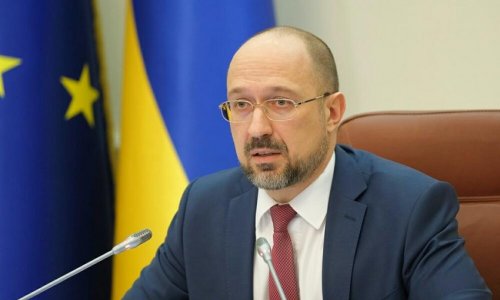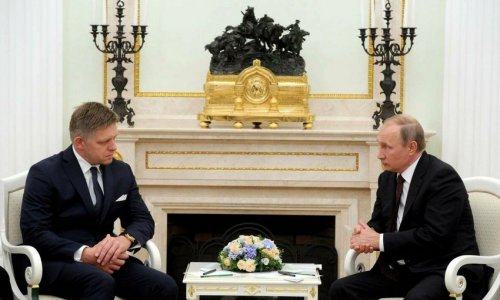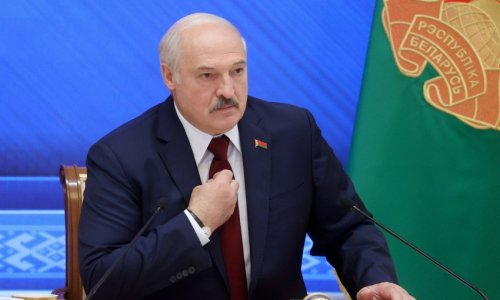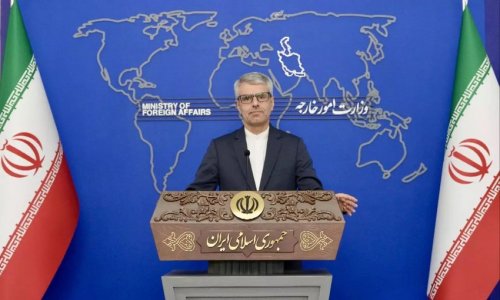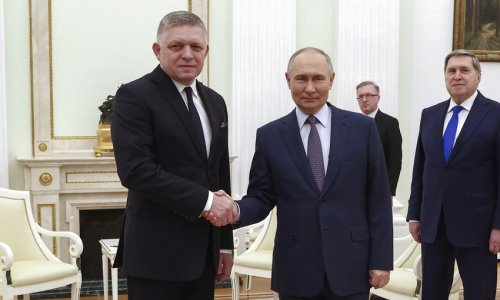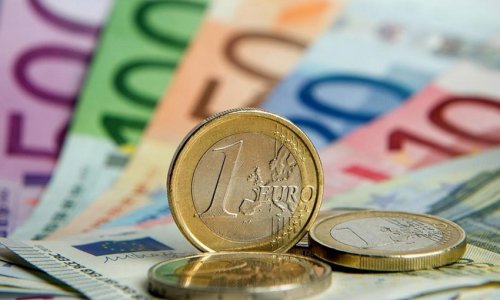On April 17, at the same time Russian President Vladimir Putin snarled at Ukraine and the West at a press conference in Moscow, Russian Foreign Minister Sergey Lavrov signed a conciliatory agreement in Geneva with the United States, the European Union and Ukraine.On the face of it, the foreign minister seemed to repudiate the President and betray the pro-Russian terrorists in eastern Ukraine.Whatever Putin and Lavrov's game, the statement signed by Lavrov in Geneva represents a major stand down by Russia. To be sure, given the Kremlin's past mendacity and slipperiness, the agreement is ultimately nothing more than a piece of paper. If Putin could breach the 1994 Budapest Memorandum on Security Assurances (wherein the United States, the United Kingdom and Russia agreed to guarantee Ukraine's security and territorial integrity), he could easily tear up the Geneva statement if and when it suits him.Photos: Crisis in UkraineIn his press conference, true to form, Putin denied the existence of Ukrainians as a separate nation, reserved to himself the right to intervene in Ukraine, and supported the pro-Putin armed commandos who have caused havoc in eastern Ukraine.Here's Putin on Ukrainians as really being Russians: "The desire to get Russia and Ukraine to quarrel, to divide what is essentially a single people has been an object of international politics for centuries." It gets worse. Putin says the fanatical Bolsheviks and their reactionary White opponents agreed on one thing only: that Ukraine and Russia were a "part of a common, united space and a single people." And, he adds, "They were absolutely right."Ukrainians, naturally, beg to differ. And they worry. If Ukraine has no right to exist as a separate nation, then why shouldn't Putin bring Ukrainians "home" whenever he chooses to follow in the footsteps of the Bolsheviks and the Whites?Here's Putin on the right to intervene to "help" Russians and "Russian-speaking citizens" in Ukraine: "But we know exactly that we ought to do everything to help these people defend their rights and independently determine their fate. This is what we will fight for. Let me remind you that the Federation Council of Russia gave the president the right to use armed forces in Ukraine. I very much hope that I will not have to exercise this right and that, through political and diplomatic means, we will be able to resolve all the acute, if not indeed very acute, problems in Ukraine today."Unsurprisingly, Putin's insistence that he has a right to aid Ukrainian citizens spooks Ukrainians, especially as his invocation of that right is coupled with the continued massing of thousands of battle-ready Russian troops along Ukraine's borders.Finally, here's Putin on the pro-Russian commandos who have terrorized southeastern Ukraine in the last week and thereby compelled Kiev to try to regain control of the region:"Now we hear of calls (by the West) to the people in the southeast to lay down their arms. ... But then (the Ukrainian authorities should) pull back the army from the civilian population. ... All right, the east will disarm, all right, let's assume the army will withdraw -- why have the (Ukrainian) nationalist groups not been disarmed yet?"One of the central points of the Geneva statement undermines Putin's concerns: "All illegal armed groups must be disarmed; all illegally seized buildings must be returned to legitimate owners; all illegally occupied streets, squares and other public places in Ukrainian cities and towns must be vacated." Geneva made it clear that all groups should be disarmed and all buildings and streets be vacated -- immediately. There is no talk in the statement of one side's disarming first and then the other's disarming next.Because virtually no Ukrainian armed groups are in Ukraine, nor are they occupying buildings -- the groups have been disarmed in the last few weeks -- the statement applies almost exclusively to the Russian-supported, Russian-funded, and Russian-directed commando-terrorists.Lavrov also signed the following statement: "Amnesty will be granted to protesters and to those who have left buildings and other public places and surrendered weapons, with the exception of those found guilty of capital crimes."This is, indirectly, a recognition of the Ukrainian government's legitimacy, something that Putin repeatedly denied at his press conference.After all, who is to capture the terrorists and determine if they committed capital crimes? The Ukrainian Ministry of Internal Affairs, the procurator's office, and the Ministry of Justice, of course. If the government is illegitimate, then so, too, they are illegitimate. Conversely, if they are legitimate, then so, too, is the government.President Obama was absolutely on the mark to be skeptical of Russian intentions. "Our strong preference would be for Mr. Putin to follow through on what is a glimmer of hope coming out of these Geneva talks," he said. "But we're not going to count on it until we see it. And in the meantime, we're going to prepare what our other options are."Even so, the Geneva document is important. It represents a standard against which the reduction of terrorist activities in eastern Ukraine and Russia's behavior toward them can be measured.Thus far, the evidence is neither encouraging nor discouraging. Russia insists the Ukrainians have to move first, the extremists in Sloviansk and Donetsk have insisted the agreement does not affect them, and their comrades in Kramatorsk have seized more buildings. On the other hand, extremists in Yenakievo abandoned the buildings they had occupied and the Donetsk separatists have promised to vacate two floors and the conference hall of the state province administration building.Regardless of the desultory response by Russia and its supporters, both the United States and Ukraine have, correctly, insisted that Russia stick to the agreement and convince its supporters in eastern Ukraine to surrender their arms and abandon the buildings they seized.Kiev has also agreed to an amnesty for those extremists who did not, as the document insists, engage in capital crimes. And Yulia Tymoshenko, the former prime minister-turned-political prisoner who is now running for president, has used the agreement as the basis for calling on the extremists to engage in roundtable discussions.The next week or two will demonstrate whether Russia is or is not serious about the Geneva agreement. If the terrorist groups do not abandon buildings and give up their arms, and if Russia does not stop infiltrating Russian intelligence agents into Ukraine, then Putin and Lavrov will effectively be declaring that they cannot be trusted and that their intentions in Ukraine are aggressive.Alternatively, if they adhere to the agreement, the document could lead to further forms of de-escalation, perhaps even including a permanent withdrawal of Russian troops from Ukraine's borders.Opinion: Why Geneva accord on Ukraine is tactical victory for Russia?Are Lavrov and Putin playing good cop-bad cop, hoping to convince the United States, the European Union, and Ukraine that Russia really is reasonable and has no aggressive intentions? If so, is this just a ploy to win time while war preparations continue? Or is their routine indicative of Russia's finally coming to its senses?Has Putin realized that invading or destabilizing Ukraine will bring him and Russia nothing except painful Western sanctions and the possible arming of Ukraine's military?Whatever the answer, it seems obvious that the West's consistent expressions of support for Ukraine and condemnation of Russia's illegal annexation of Crimea, along with Kiev's decision finally to resist Russian aggression, played some role in convincing Putin to have Lavrov make nice.The moral is clear: Talk tough and act tough, and Putin may just possibly listen.(CNN)ANN.Az
Putin's strategy: Good cop, bad cop
World
12:30 | 24.04.2014
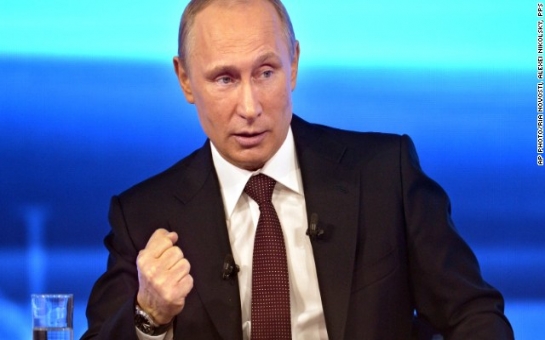
Putin's strategy: Good cop, bad cop
So, just what is Russia up to now?
Follow us !

